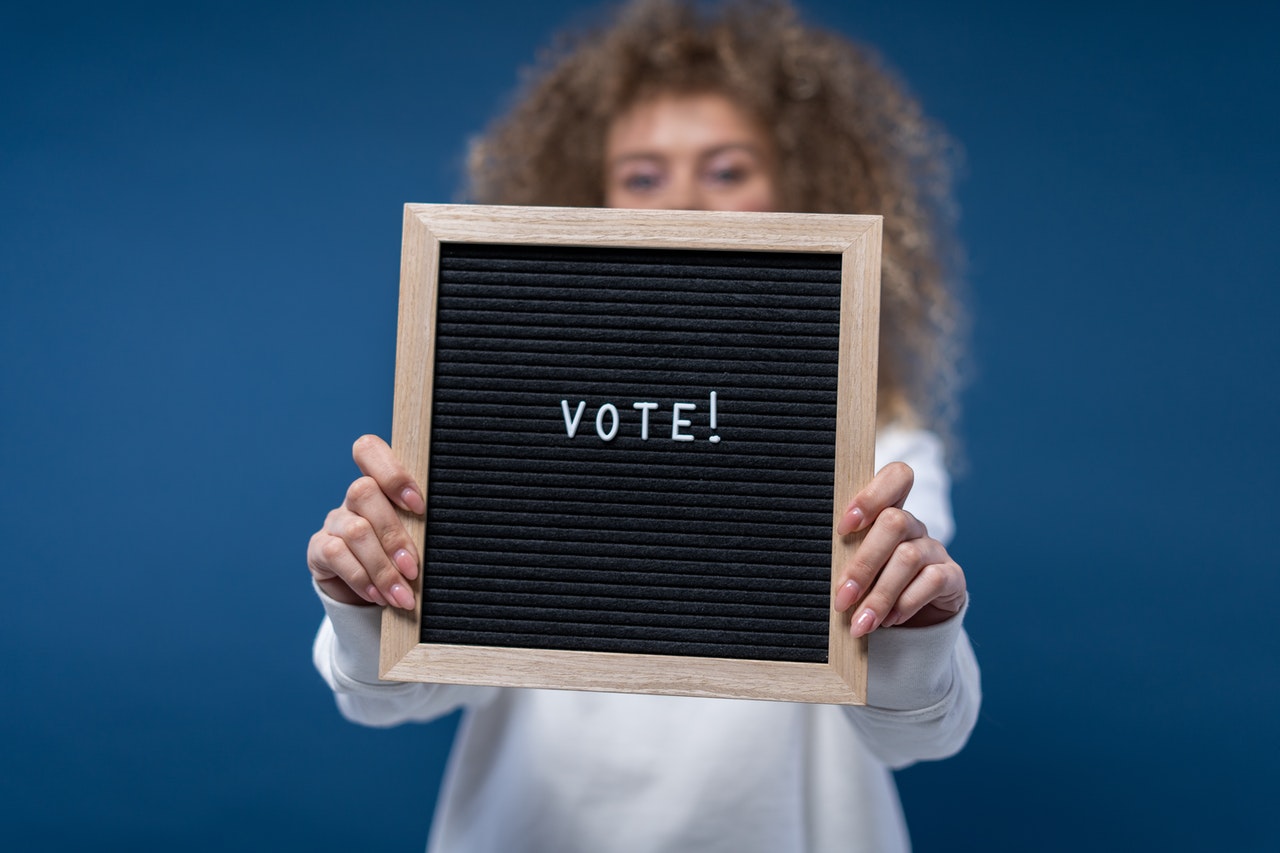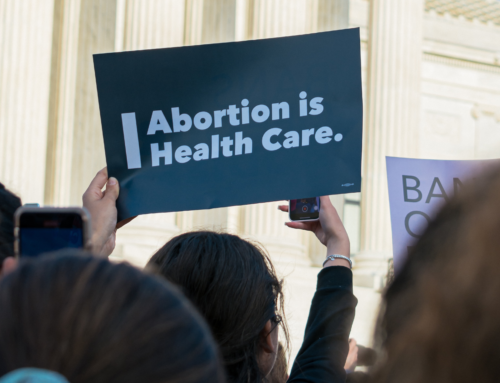Politics is a sensitive subject for many people. While it can be hard to discuss, there are a number of important matters related to sexual rights that will be impacted by the U.S. elections.
The entire world is watching the upcoming election here in the United States, because what is decided in this country next week will have ripple effects around the globe. If you live here, we hope you’ve already got a plan in place to vote (or perhaps you’re one of the millions who have already voted early—if so, THANKS).
Voting is a right and a responsibility that we should not take for granted. Especially if you identify as female or any type of racial minority, our right to vote was hard won by our elders and ancestors.
For those of us who identify as any gender or sexual minority, our rights to live and love as we wish are at risk. Only by voting in huge numbers can we hope to retain the progress we’ve made and go further toward true equality.
We don’t want to tell you HOW to vote, but we do want to bring your attention to some of the areas pertinent to our field that are “on the ballot,” so to speak.
Check out this article for an excellent side-by-side look at the positions of both Trump and Biden on issues associated with women’s health.
This article lists all the issues that are tied to LGBTQ+ rights and protections. This article goes into detail about the candidates’ stances on LBGTQ+ issues.
Marriage Equality Act
Unfortunately, some of our rights and protections are already potentially under siege by the Supreme Court. If Amy Coney Barrett’s nomination is approved, then the Marriage Equality Act, trans rights, the Affordable Care Act, and the rights to a safe and legal abortion are at risk of being overturned, which could have devastating consequences for us all.
Of course, this is not yet a done deal. On Oct. 21, two of the lawyers who were on opposing sides of the case that resulted in the Marriage Equality Act just came out united in their position that Barrett’s nomination should NOT be confirmed.
“We ask the Senate to vote no on this nomination,” Obergefell said during a livestreamed press conference Tuesday. “Judge Barrett’s well-known stances on marriage equality, trans equality and other issues represent a serious risk to our civil rights and our ability to form and protect our families.” (NBC News)
If Barrett’s nomination is not confirmed, then whoever wins this election will nominate the next Supreme Court justice.
Affordable Care Act & Women’s Health
Did you know that before the ACA was passed, women could be charged more for healthcare, simply for being female? Women could be denied insurance coverage if they suffered from a “female” health condition, such as pregnancy, breast cancer, or depression (we won’t even get into the fact that men and trans people also suffer from breast cancer and depression). The ACA also provides for women’s preventative healthcare, such as breastfeeding support, breast cancer screenings, and well-woman visits.
Though there was a lot wrong with the way the ACA was passed, and certain elements of it have been problematic, this legislation expanded healthcare access for millions of women, particularly for things commonly thought of as women’s conditions. Until something stronger is proposed and passed that doesn’t take away this expanded access, the ACA should probably not be simply abolished. So far, the current administration’s position on healthcare does not meet that baseline.
Violence Against Women
The Violence Against Women Act, passed in 1994, was designed to end domestic violence, dating violence, sexual assault, and stalking perpetuated against women. It expired in 2018, and the Senate has refused to pass the House’s bill aimed at resurrecting it because of the provision banning those convicted of domestic violence from buying firearms.
USA Today says, “Between 1994 and 2010, intimate partner violence has dropped by more than 60 percent, according to the Department of Justice, a precipitous decline that experts at least partially attribute to the law’s passage.”
Unfortunately, since Covid-19 hit, calls to domestic violence hotlines and rape crisis hotlines have jumped dramatically. Indications are that violence against women (and transgender people) has increased. If this act is not reauthorized, funding for programs to help address the consequences and decrease the incidence of domestic violence will dry up.
Remember, we’re not just electing a President next Tuesday. We’re also voting on a significant number of Congresspeople, many of whom disagree that the Violence Against Women Act should be reauthorized.
LGBTQ+ Rights & Protections
The current administration has downgraded civil rights for LGBTQ+ people in the ACA, banned trans people from serving in the military, and enabled LGBTQ+ discrimination through religious liberty guidance.
In a September opinion piece in the New York Times, the author listed just a few of the anti-LGBTQ+ stances taken by Trump and his administration:
“…The messaging began the first week of his administration, when mention of L.G.B.T.Q. rights disappeared from the White House website.
This was just for starters. Later, he rejected plans to add questions about gender identity and sexual orientation to the 2020 census. He banned trans people from the military. On the anniversary of the Pulse nightclub shooting, he announced that his administration would roll back Obama-era health care protections for trans people. He prohibited embassies from flying the rainbow flag on flagpoles. For three out of four Junes he has failed to mention Pride Month — although one time he did take time out of his busy schedule to talk up National Homeownership Month.
His Department of Justice filed a brief with the Supreme Court endorsing the idea that employers had the right to fire L.G.B.T.Q. people just for being themselves. In the end, even the conservative-majority Supreme Court ruled against him. But the idea that the president of the United States went out of his way to put me, and people like me, at risk, is harrowing.
This August, at its convention, the Trump Republican Party re-endorsed its 2016 platform. You know, the one that sanctifies “traditional marriage” and condemns the Supreme Court ruling in favor of marriage equality. The one that describes the ruling defending a marriage like mine as “full of ‘silly extravagances.’”
Last week the administration filed a brief with the Indiana Supreme Court making the case that a Catholic school can fire a gay teacher who marries. It’s a First Amendment case, the administration says. Because persecuting L.G.B.T.Q. people is a form of free expression, I guess. Like cake frosting…”
On the other hand, even though Biden in earlier years was no friend to the LGBTQ+ community, his views have evolved to be far more accepting and celebratory of gay and trans rights and protections.
According to a recent article in USA Today:
“…A Biden administration would have a lot of work ahead just to bring the country in compliance with the law.
In March, Biden released a plan to reverse Trump’s anti-LGBTQ+ policies and move the community forward. The plan commits to passing the Equality Act, which would add anti-discrimination protections to the Civil Rights Act of 1964. It also specifically addresses Trump administration policies that LGBTQ+ organizations say are hostile.
Biden has also pledged to make it easier for trans people to update their government-issued IDs, including obtaining gender-neutral passports. That proposal comes in the wake of a five-year battle between intersex Navy veteran Dana Zzyym and Trump’s Department of Justice, which has repeatedly refused to issue Zzyym a passport with an “X” gender marker, despite court orders.
Biden has also promised to combat what many say is a crisis of violence facing Black trans women. With two months left to go, more transgender people have been murdered in 2020 than any year in recorded history. Biden also says he will tackle employment and housing discrimination, two critical areas that leave many exposed to violence and survival crimes, advocates say…”
Do Your Homework, Then Vote
Do your homework. Look up what the various candidates stand for on the issues you care most about and decide for yourself whose values most closely align with your own. Who do you believe will represent your best interests AND the best interests of the people you care for and work with?
Then make a plan to vote and, if you can, help someone else get to the polls, too. Make your voice heard next week, and be prepared to be patient while record numbers of votes are being counted (it could take a couple weeks to know who won).
Curious about training to become a Certified Sex Coach™? Join the next live Info Session to meet the SCU team and participate in a live Q&A!





